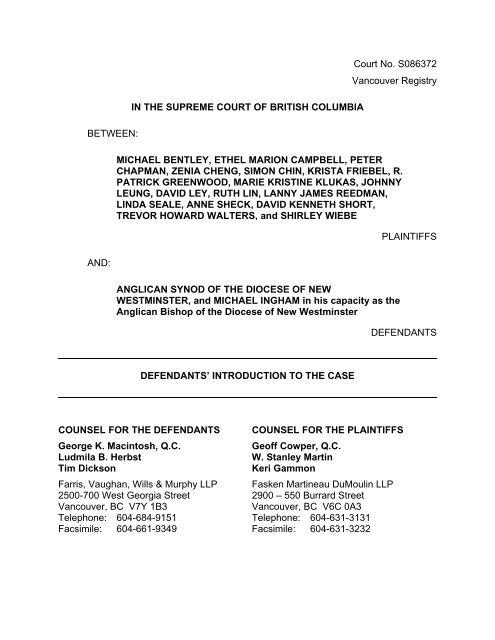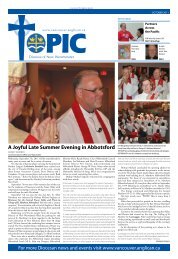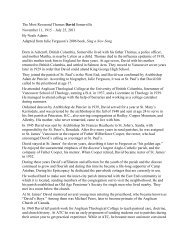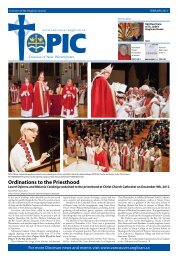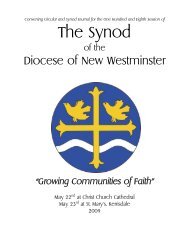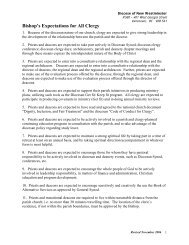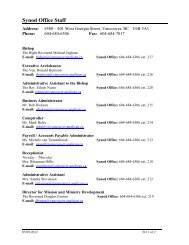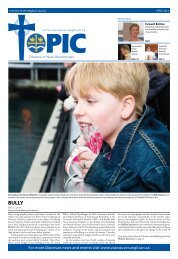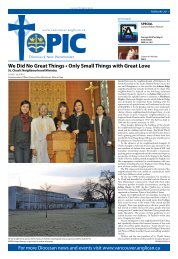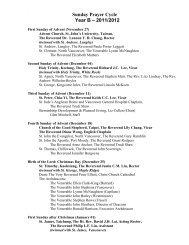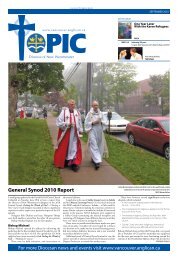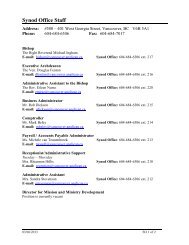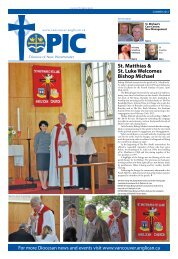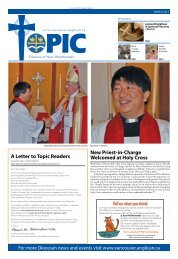introduction - Diocese of New Westminster - the Anglican Church of ...
introduction - Diocese of New Westminster - the Anglican Church of ...
introduction - Diocese of New Westminster - the Anglican Church of ...
You also want an ePaper? Increase the reach of your titles
YUMPU automatically turns print PDFs into web optimized ePapers that Google loves.
BETWEEN:<br />
AND:<br />
IN THE SUPREME COURT OF BRITISH COLUMBIA<br />
Court No. S086372<br />
Vancouver Registry<br />
MICHAEL BENTLEY, ETHEL MARION CAMPBELL, PETER<br />
CHAPMAN, ZENIA CHENG, SIMON CHIN, KRISTA FRIEBEL, R.<br />
PATRICK GREENWOOD, MARIE KRISTINE KLUKAS, JOHNNY<br />
LEUNG, DAVID LEY, RUTH LIN, LANNY JAMES REEDMAN,<br />
LINDA SEALE, ANNE SHECK, DAVID KENNETH SHORT,<br />
TREVOR HOWARD WALTERS, and SHIRLEY WIEBE<br />
ANGLICAN SYNOD OF THE DIOCESE OF NEW<br />
WESTMINSTER, and MICHAEL INGHAM in his capacity as <strong>the</strong><br />
<strong>Anglican</strong> Bishop <strong>of</strong> <strong>the</strong> <strong>Diocese</strong> <strong>of</strong> <strong>New</strong> <strong>Westminster</strong><br />
PLAINTIFFS<br />
DEFENDANTS<br />
DEFENDANTS’ INTRODUCTION TO THE CASE<br />
COUNSEL FOR THE DEFENDANTS<br />
George K. Macintosh, Q.C.<br />
Ludmila B. Herbst<br />
Tim Dickson<br />
Farris, Vaughan, Wills & Murphy LLP<br />
2500-700 West Georgia Street<br />
Vancouver, BC V7Y 1B3<br />
Telephone: 604-684-9151<br />
Facsimile: 604-661-9349<br />
COUNSEL FOR THE PLAINTIFFS<br />
Ge<strong>of</strong>f Cowper, Q.C.<br />
W. Stanley Martin<br />
Keri Gammon<br />
Fasken Martineau DuMoulin LLP<br />
2900 – 550 Burrard Street<br />
Vancouver, BC V6C 0A3<br />
Telephone: 604-631-3131<br />
Facsimile: 604-631-3232
- 1 -<br />
The <strong>Anglican</strong> <strong>Church</strong> <strong>of</strong> Canada, <strong>the</strong> <strong>Diocese</strong> <strong>of</strong> <strong>New</strong> <strong>Westminster</strong> and <strong>the</strong><br />
Blessing <strong>of</strong> Same-Sex Unions<br />
1. The church properties at issue in this case were built, dedicated and/or<br />
consecrated, and have always been contributed to and attended, as part <strong>of</strong> <strong>the</strong> <strong>Anglican</strong><br />
<strong>Church</strong> <strong>of</strong> Canada (<strong>the</strong> “ACC”). The ACC is a self-governing, nation-wide church and is<br />
a member <strong>of</strong> <strong>the</strong> worldwide <strong>Anglican</strong> Communion, which is a voluntary association <strong>of</strong><br />
<strong>Anglican</strong> churches. The ACC comprises four Ecclesiastical Provinces, <strong>the</strong> relevant one<br />
<strong>of</strong> which (British Columbia and Yukon) comprises several dioceses, <strong>of</strong> which <strong>the</strong><br />
<strong>Diocese</strong> <strong>of</strong> <strong>New</strong> <strong>Westminster</strong> (“<strong>the</strong> <strong>Diocese</strong>”) is one. <strong>Diocese</strong>s, in turn, comprise a<br />
number <strong>of</strong> parishes, which in <strong>the</strong> <strong>Diocese</strong> <strong>of</strong> <strong>New</strong> <strong>Westminster</strong> are generally<br />
incorporated and hold title to <strong>the</strong> church buildings associated with <strong>the</strong>m.<br />
2. The <strong>Anglican</strong> <strong>Church</strong> is an extremely hierarchical institution. It has elaborate and<br />
well-developed institutions for decision-making, including a body <strong>of</strong> canon law. At <strong>the</strong><br />
highest level – <strong>the</strong> <strong>Anglican</strong> <strong>Church</strong> <strong>of</strong> Canada – it has a representative legislative body<br />
(<strong>the</strong> General Synod) and an executive body (<strong>the</strong> Primate and <strong>the</strong> Council <strong>of</strong> General<br />
Synod). That structure is mirrored at <strong>the</strong> diocesan level. There is also a middle level –<br />
<strong>the</strong> Ecclesiastical Provinces – with that same structure. These entities are incorporated<br />
by special statutes, which spell out <strong>the</strong>ir powers and purposes, and those powers and<br />
purposes are fur<strong>the</strong>r specified in very detailed Canons and Rules and Regulations.<br />
There are ecclesiastical courts to resolve disputes. There are also many o<strong>the</strong>r<br />
institutional structures, including an option (called Shared Episcopal Ministry) for<br />
parishioners who are in <strong>the</strong>ological dispute with <strong>the</strong>ir bishop to receive episcopal<br />
oversight from ano<strong>the</strong>r bishop within <strong>the</strong> <strong>Anglican</strong> <strong>Church</strong> <strong>of</strong> Canada.<br />
3. The current dispute over homosexuality is <strong>the</strong> latest in a long series <strong>of</strong> debates<br />
within <strong>Anglican</strong>ism as it adapts to social change. O<strong>the</strong>r recent debates include <strong>the</strong><br />
remarriage <strong>of</strong> divorced persons and <strong>the</strong> ordination <strong>of</strong> women. As with <strong>the</strong><br />
homosexuality debate, in those contexts <strong>the</strong>re was vociferous disagreement over<br />
Scripture and religious belief. In those contexts, <strong>the</strong> <strong>Anglican</strong> <strong>Church</strong> <strong>of</strong> Canada (and<br />
o<strong>the</strong>r autonomous churches within <strong>the</strong> worldwide <strong>Anglican</strong> Communion) engaged in a
- 2 -<br />
long process <strong>of</strong> dialogue and settled <strong>the</strong> issues according to its internal governance<br />
structures.<br />
4. With homosexuality generally and <strong>the</strong> blessing <strong>of</strong> same-sex unions specifically, <strong>the</strong><br />
<strong>Church</strong> has been engaged in vigorous debate in all <strong>of</strong> <strong>the</strong> various forums <strong>of</strong> its<br />
institutional structure – from <strong>the</strong> General Synod, to <strong>the</strong> diocesan synods, to <strong>the</strong> parish<br />
level. In this <strong>Diocese</strong>, <strong>the</strong> Synod voted three times to petition <strong>the</strong> Bishop to approve <strong>the</strong><br />
blessings. Twice he denied that request, but on <strong>the</strong> third time consented. Between <strong>the</strong><br />
votes, <strong>the</strong> Bishop established formal dialogue processes to ensure that all views were<br />
aired in <strong>the</strong> hope <strong>of</strong> reaching greater understanding and consensus. The Bishop’s<br />
authorization <strong>of</strong> <strong>the</strong> blessings is subject to certain “conscience” provisions, which<br />
provide that such blessings may only occur in parishes where both <strong>the</strong> congregation<br />
and <strong>the</strong> priest support and request <strong>the</strong>m, and a priest may always refuse to conduct <strong>the</strong><br />
blessing if it is against his or her conscience.<br />
5. The four parishes with which <strong>the</strong> Plaintiffs were associated participated in this long<br />
debate at every level. Nei<strong>the</strong>r <strong>the</strong> General Synod nor <strong>the</strong> Diocesan Synod has resolved<br />
<strong>the</strong> issues as <strong>the</strong> Plaintiffs would wish, however, and so <strong>the</strong> Plaintiffs have sued,<br />
alleging that <strong>the</strong> church properties are held on a trust that would freeze <strong>Anglican</strong>ism as<br />
<strong>the</strong>y would define it. The Plaintiffs have not challenged <strong>the</strong> Bishop’s jurisdiction to<br />
authorize <strong>the</strong> blessings, <strong>the</strong>y have not challenged <strong>the</strong> validity <strong>of</strong> <strong>the</strong> blessings in <strong>the</strong><br />
ecclesiastical court (<strong>the</strong> ACC’s Supreme Court <strong>of</strong> Appeal) and <strong>the</strong>y have not sought to<br />
charge <strong>the</strong> Bishop with an ecclesiastical <strong>of</strong>fence. Nor have <strong>the</strong>y accepted <strong>the</strong> <strong>of</strong>fer <strong>of</strong><br />
Shared Episcopal Ministry, which a body <strong>of</strong> <strong>the</strong> <strong>Anglican</strong> Communion commended as<br />
appropriate. Instead, <strong>the</strong>y seek to split up <strong>the</strong> ACC by attempting to leave <strong>the</strong> <strong>Diocese</strong><br />
and take with <strong>the</strong>m church properties that were established as part <strong>of</strong> it.<br />
6. The Defendants submit that <strong>the</strong> Plaintiffs’ action is utterly groundless and ought to<br />
be dismissed on <strong>the</strong> basis <strong>of</strong> any <strong>of</strong> <strong>the</strong> following four points. First, <strong>the</strong> church<br />
properties are held in <strong>the</strong> name <strong>of</strong> <strong>the</strong> parish corporations, which are inherently part <strong>of</strong><br />
<strong>the</strong> <strong>Diocese</strong> and have no lawful power to leave it. Second, <strong>the</strong> <strong>Anglican</strong> <strong>Church</strong> <strong>of</strong><br />
Canada’s sophisticated governance structure supersedes any trust. It allows for <strong>the</strong>
- 3 -<br />
<strong>Diocese</strong>’s authorization <strong>of</strong> <strong>the</strong> blessing <strong>of</strong> same-sex unions, but in any event, a breach<br />
<strong>of</strong> that structure would not lead to <strong>the</strong> break-up <strong>of</strong> <strong>the</strong> <strong>Church</strong>. Third, any trust that<br />
might apply <strong>the</strong> properties in this context is plainly not defined as <strong>the</strong> Plaintiffs allege.<br />
Last, even if <strong>the</strong> trust were defined as <strong>the</strong> Plaintiffs allege, it has not been breached.<br />
The Parishes Are Inherently Part <strong>of</strong> <strong>the</strong> <strong>Diocese</strong><br />
7. The first point is that parishes have no existence independent <strong>of</strong> dioceses in <strong>the</strong><br />
legal structure <strong>of</strong> <strong>the</strong> <strong>Anglican</strong> <strong>Church</strong> <strong>of</strong> Canada. In some dioceses <strong>the</strong> parishes are<br />
not even incorporated, and all <strong>the</strong> property is held by <strong>the</strong> diocese. In <strong>the</strong> <strong>Diocese</strong> <strong>of</strong><br />
<strong>New</strong> <strong>Westminster</strong>, <strong>the</strong> parishes are incorporated and <strong>the</strong> parish corporations hold <strong>the</strong><br />
property. Those parishes corporations, however, are incorporated under <strong>the</strong> special Act<br />
that incorporates <strong>the</strong> <strong>Diocese</strong>: that special legislation – <strong>the</strong> purpose <strong>of</strong> which is to<br />
incorporate <strong>the</strong> <strong>Diocese</strong> – sets out an option for parishes to incorporate (only with <strong>the</strong><br />
consent <strong>of</strong> <strong>the</strong> Bishop) and sets out <strong>the</strong>ir powers and structure and creates a special<br />
registry for <strong>the</strong> parish corporations. (The <strong>Diocese</strong> was incorporated in 1893 and each <strong>of</strong><br />
<strong>the</strong> four parishes was incorporated under <strong>the</strong> Act at various times <strong>the</strong>reafter; St. John’s<br />
Shaughnessy, for example, was incorporated in 1932.) The Act also states that<br />
property held by incorporated parishes may only be mortgaged, sold or o<strong>the</strong>rwise<br />
disposed <strong>of</strong> with <strong>the</strong> consent <strong>of</strong> <strong>the</strong> Executive Committee <strong>of</strong> <strong>the</strong> Synod and <strong>the</strong> Bishop.<br />
Fur<strong>the</strong>r, <strong>the</strong> Canons <strong>of</strong> <strong>the</strong> <strong>Diocese</strong> give <strong>the</strong> Bishop <strong>of</strong> <strong>the</strong> Executive Committee <strong>of</strong> <strong>the</strong><br />
Synod very extensive powers to regulate and control <strong>the</strong> affairs <strong>of</strong> parishes, including<br />
<strong>the</strong> property held by <strong>the</strong>m.<br />
8. The point is that parish corporations are inherently part <strong>of</strong> <strong>the</strong> <strong>Diocese</strong>. As a<br />
matter <strong>of</strong> corporate law, it is ultra vires for <strong>the</strong>m to purport to leave <strong>the</strong> <strong>Diocese</strong>. They<br />
can only exist as part <strong>of</strong> <strong>the</strong> <strong>Diocese</strong>.<br />
The <strong>Church</strong> Properties Are Governed by <strong>the</strong> <strong>Church</strong> Structures, Which Allow for<br />
<strong>the</strong> Blessings<br />
9. The dispute between <strong>the</strong> parties is properly determined by <strong>the</strong> statutes, canons<br />
and by-laws that govern <strong>the</strong> <strong>Church</strong> and its property. The law is clear that, where a
- 4 -<br />
church has a hierarchical structure that governs how decisions are made and <strong>the</strong><br />
property is used, <strong>the</strong>n that structure prevails to determine ownership and control. This<br />
is contrast to <strong>the</strong> case <strong>of</strong> a congregational church with few rules as to how decisions are<br />
made, where <strong>the</strong> law <strong>of</strong> trusts may regulate <strong>the</strong> use <strong>of</strong> <strong>the</strong> property.<br />
10. The trust declarations that <strong>the</strong> Plaintiffs seek are entirely inappropriate and<br />
inapplicable. The <strong>Church</strong> is set up as a hierarchical institution in which various bodies<br />
have certain and specific powers. If <strong>the</strong> Defendants or o<strong>the</strong>r bodies in <strong>the</strong> <strong>Anglican</strong><br />
<strong>Church</strong> <strong>of</strong> Canada have stepped outside <strong>of</strong> <strong>the</strong>ir proper roles or misused <strong>the</strong>ir powers –<br />
which <strong>the</strong>y have not – <strong>the</strong>n it would be appropriate to ask an ecclesiastical, or even civil,<br />
court to declare that to be so and to correct <strong>the</strong> problem by quashing <strong>the</strong> impugned<br />
decision. It is completely unfounded, however, for <strong>the</strong> Plaintiffs to ask <strong>the</strong> court to break<br />
up <strong>the</strong> church by divvying up <strong>the</strong> property on <strong>the</strong> basis <strong>of</strong> some trust that is defined by<br />
reference to religious belief. That is utterly contrary to <strong>the</strong> idea <strong>of</strong> a <strong>Church</strong> set up as a<br />
perpetuating and national institution that has control over its own doctrines and<br />
properties.<br />
11. In any event, <strong>the</strong> Bishop’s authorization <strong>of</strong> <strong>the</strong> blessings is entirely consistent with<br />
<strong>the</strong> <strong>Church</strong> structures. The General Synod resolved in 2007 that “<strong>the</strong> blessing <strong>of</strong> samesex<br />
unions is consistent with <strong>the</strong> core doctrine <strong>of</strong> The <strong>Anglican</strong> <strong>Church</strong> <strong>of</strong> Canada”. The<br />
Diocesan Synod voted three times – <strong>the</strong> third time by over 60% – to request<br />
authorization <strong>of</strong> <strong>the</strong> blessings, and <strong>the</strong> Bishop has <strong>the</strong> jurisdiction to authorize <strong>the</strong>m<br />
(under what is known as jus liturgicum). While many <strong>Anglican</strong>s around <strong>the</strong> world<br />
disagree with <strong>the</strong> blessings, <strong>the</strong> ACC continues to be <strong>the</strong> only ecclesial body in Canada<br />
that is a member <strong>of</strong> <strong>the</strong> <strong>Anglican</strong> Communion (as <strong>the</strong> Archbishop <strong>of</strong> Canterbury stated<br />
last year in connection with <strong>the</strong> dispute).<br />
Any Trust Is Not Defined as <strong>the</strong> Plaintiffs Allege<br />
12. To any extent that <strong>the</strong> properties are governed by trust law, <strong>the</strong> trust is not defined<br />
as <strong>the</strong> Plaintiffs allege. Ra<strong>the</strong>r, <strong>the</strong> trust is for <strong>the</strong> promulgation <strong>of</strong> <strong>the</strong> Christian faith as<br />
interpreted by <strong>the</strong> <strong>Anglican</strong> <strong>Church</strong> <strong>of</strong> Canada and <strong>the</strong> Synod. Such a trust would be<br />
consistent with <strong>the</strong> Act, <strong>the</strong> Constitution and Canons <strong>of</strong> <strong>the</strong> Synod <strong>of</strong> <strong>the</strong> <strong>Diocese</strong>, and
- 5 -<br />
<strong>the</strong> consecration <strong>of</strong> churches (toward which <strong>the</strong> priest and churchwardens <strong>of</strong> a parish<br />
petition <strong>the</strong> Bishop to “set it apart for ever for <strong>the</strong> worship <strong>of</strong> God, according to <strong>the</strong> rites<br />
and discipline <strong>of</strong> <strong>the</strong> <strong>Anglican</strong> <strong>Church</strong> <strong>of</strong> Canada”), among many o<strong>the</strong>r things.<br />
13. For <strong>the</strong>ir part, <strong>the</strong> Plaintiffs allege that <strong>the</strong> properties held by each <strong>of</strong> <strong>the</strong> parishes<br />
are held “for <strong>the</strong> congregation for <strong>the</strong> purpose <strong>of</strong> ministry consistent with historic,<br />
orthodox <strong>Anglican</strong> doctrine and practice”, which <strong>the</strong>y say can only be fulfilled through<br />
<strong>the</strong> unprecedented step <strong>of</strong> aligning with <strong>the</strong> <strong>Anglican</strong> <strong>Church</strong> <strong>of</strong> <strong>the</strong> Sou<strong>the</strong>rn Cone<br />
(which is in South America). This alleged trust is nonsensical for a number <strong>of</strong> reasons,<br />
including:<br />
1) It is inconsistent with <strong>the</strong> <strong>Anglican</strong> <strong>Church</strong> <strong>of</strong> Canada’s power – explicitly set<br />
out in its Canons – to define <strong>the</strong> doctrine <strong>of</strong> <strong>the</strong> <strong>Church</strong>. That power is held by<br />
every Province (national church) in <strong>the</strong> <strong>Anglican</strong> Communion. It is not <strong>the</strong><br />
<strong>Anglican</strong> Communion that defines doctrine (such as is done in <strong>the</strong> Catholic<br />
<strong>Church</strong>), but ra<strong>the</strong>r <strong>the</strong> 38 Provinces (that is, <strong>the</strong> national churches that<br />
compose <strong>the</strong> <strong>Anglican</strong> Communion) acting independently within <strong>the</strong>ir own<br />
territories. In Canada, <strong>the</strong> <strong>Church</strong> set up a representative, legislative body<br />
(<strong>the</strong> General Synod) to exercise <strong>the</strong> power to define doctrine; <strong>the</strong> Plaintiffs’<br />
alleged trust would completely undermine that institution.<br />
2) A trust that freezes doctrine at some (unspecified) historical point is entirely<br />
inconsistent with <strong>Anglican</strong>ism’s history <strong>of</strong> change and evolution and its wide<br />
diversity around <strong>the</strong> globe. <strong>Anglican</strong>ism has always accommodated change<br />
and diversity. That is part <strong>of</strong> how it has been a worldwide faith for over 400<br />
years.<br />
3) It is inconsistent with <strong>the</strong> structure <strong>of</strong> <strong>the</strong> <strong>Anglican</strong> Communion, in which <strong>the</strong><br />
Provinces are defined according to exclusive territorial boundaries.<br />
4) Internally, <strong>the</strong> trust alleged by <strong>the</strong> Plaintiffs is uncertain and nonsensical.<br />
“Historic, orthodox <strong>Anglican</strong> doctrine and practice” is not a phrase defined in<br />
<strong>Anglican</strong>ism. What time period does “historic” <strong>Anglican</strong>ism relate to? Whose<br />
beliefs are “orthodox”? Who is <strong>the</strong> “congregation” – only <strong>the</strong> current
- 6 -<br />
parishioners, or all past, present and future parishioners? The trust as defined<br />
by <strong>the</strong> Plaintiffs is far too uncertain to be enforceable. Fur<strong>the</strong>r, it would require<br />
<strong>the</strong> civil courts to stray too far into matters <strong>of</strong> religious belief.<br />
The trust as alleged by <strong>the</strong> Plaintiffs has not been breached<br />
14. Last, even if <strong>the</strong> properties are held on trust on <strong>the</strong> terms <strong>the</strong> Plaintiffs allege, that<br />
trust has not been breached. The Bishop only authorized <strong>the</strong> blessings after a long<br />
process <strong>of</strong> dialogue in which <strong>the</strong> Synod repeatedly, and by a clear majority, requested<br />
him to do so, and he only did so subject to conscience clauses. The General Synod –<br />
<strong>the</strong> highest body in <strong>the</strong> <strong>Anglican</strong> <strong>Church</strong> <strong>of</strong> Canada – has determined that <strong>the</strong> blessing<br />
<strong>of</strong> same-sex unions is consistent with <strong>the</strong> core doctrines <strong>of</strong> <strong>the</strong> <strong>Anglican</strong> <strong>Church</strong> <strong>of</strong><br />
Canada. And whereas <strong>the</strong> Plaintiffs have alleged that <strong>the</strong> <strong>Anglican</strong> <strong>Church</strong> <strong>of</strong> Canada is<br />
no longer in “full communion” with <strong>the</strong> <strong>Anglican</strong> Communion, that is clearly not <strong>the</strong> case.<br />
The Archbishop <strong>of</strong> Canterbury (<strong>the</strong> leader <strong>of</strong> <strong>the</strong> <strong>Anglican</strong> Communion) has stated<br />
unequivocally that <strong>the</strong> ACC is part <strong>of</strong> <strong>the</strong> <strong>Anglican</strong> Communion – and indeed is <strong>the</strong> only<br />
Canadian member <strong>of</strong> <strong>the</strong> <strong>Anglican</strong> Communion. Both <strong>the</strong> ACC’s Primate and <strong>the</strong><br />
<strong>Diocese</strong>’s Bishop were invited to <strong>the</strong> <strong>Anglican</strong> Communion’s decennial Lambeth<br />
Conference – ano<strong>the</strong>r clear indication that <strong>the</strong> ACC (and through it, <strong>the</strong> <strong>Diocese</strong>) is in<br />
full communion with Canterbury. The ACC also participates as a full voting member <strong>of</strong><br />
<strong>the</strong> only worldwide <strong>Anglican</strong> legislative body, <strong>the</strong> <strong>Anglican</strong> Consultative Council.<br />
15. In contrast, it is <strong>the</strong> <strong>Anglican</strong> Network – which <strong>the</strong> Plaintiffs have joined – which is<br />
walking apart from <strong>Anglican</strong>ism. Seeking to leave an <strong>Anglican</strong> Province (<strong>the</strong> <strong>Anglican</strong><br />
<strong>Church</strong> <strong>of</strong> Canada) and have ano<strong>the</strong>r Province (<strong>the</strong> <strong>Anglican</strong> <strong>Church</strong> <strong>of</strong> <strong>the</strong> Sou<strong>the</strong>rn<br />
Cone) unilaterally exercise jurisdiction over <strong>the</strong>m is unprecedented and completely<br />
contrary to <strong>the</strong> <strong>Anglican</strong> Communion’s territorial structure. The Archbishop <strong>of</strong><br />
Canterbury and a special international panel (convened specifically at <strong>the</strong> request <strong>of</strong> <strong>the</strong><br />
Plaintiffs to consider this dispute) have both condemned <strong>the</strong> Network’s attempt to create<br />
a cross-territorial jurisdiction. Fur<strong>the</strong>rmore, Donald Harvey, a retired bishop who himself<br />
left <strong>the</strong> ACC and who acts as <strong>the</strong> Network’s “Moderator” in Canada, was not invited to
- 7 -<br />
<strong>the</strong> Lambeth Conference. The Network is not a member <strong>of</strong> <strong>the</strong> <strong>Anglican</strong> Consultative<br />
Council.<br />
16. Even if this court finds that this dispute should be adjudicated on trust law (which it<br />
ought not to be), and if <strong>the</strong> trust is defined as <strong>the</strong> Plaintiffs allege (which it ought not to<br />
be), <strong>the</strong> Defendants have not breached that trust. It is clearly <strong>the</strong> Plaintiffs and <strong>the</strong><br />
Network who are acting outside <strong>of</strong> <strong>Anglican</strong>ism.


